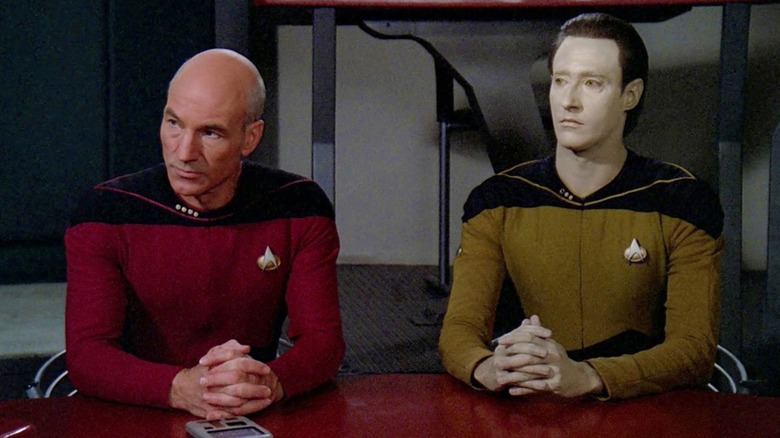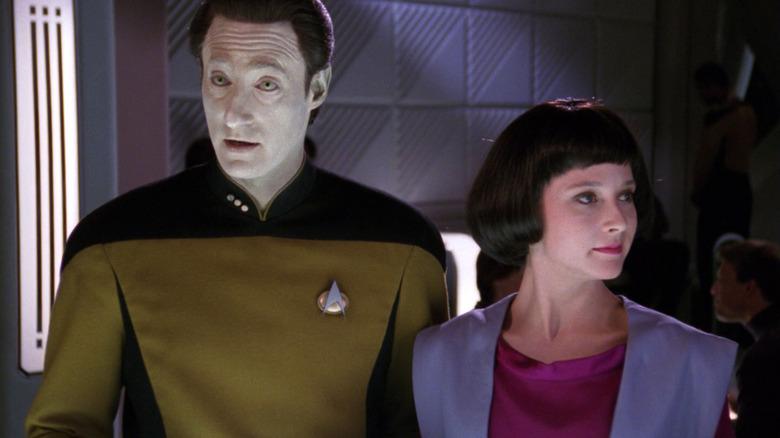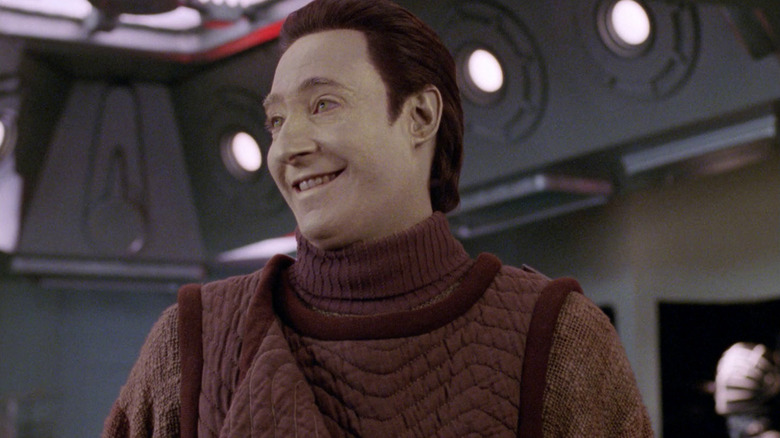One Star Trek Episode Convinced Patrick Stewart That Brent Spiner Should've Won An Emmy
The writers of "Star Trek: The Next Generation" had a whole panoply of characters to work with, but they clearly liked Captain Picard (Patrick Stewart) and Lieutenant Commander Data (Brent Spiner) the best. Of the episodes that focus on single members of the ensemble, Picard and Data seemingly had the most, and were usually given stirringly dramatic stories and no small amount of screen time. Picard was an interesting character as he was stern and resolute, and audiences liked to see his unflappable integrity get tested. Data was an interesting character as he was an android aspiring to be more human, despite having no human emotions. Data looked at humanity objectively, and eager Trekkies likely constructed imaginary conversations in their heads as to how they would explain humanity to Data (should they ever meet him).
Spiner's challenge in playing Data was mustering up emotional moments from within the artificial brain of a machine person. Data repeatedly professed that he felt nothing, but he clearly felt impulses toward curiosity, socialization, perplexity, and even justice. This implies emotions of wonderment, loneliness, relief and understanding, and outrage. There were occasional moments when something like an emotional response would break through Data's artificial exterior.
Stewart admires Spiner's performance as Data, an admiration he professes openly in his new autobiography "Making It So: A Memoir." Indeed, Stewart reflects on one episode in particular — "The Offspring" (March 12, 1990), wherein Data sees his own self-built android daughter die right in front of him. By Stewart's estimation, that episode was proof that Spiner was a great actor. Further Data-adjacent moments throughout additional episodes of "Next Generation" only made Stewart sharply aware that Spiner deserved an Emmy.
'The Offspring'
"The Offspring" saw Data struck by a fit of reproductive pique. One of the conceits of "Next Generation" is that Data is such an advanced machine that recreating him is a near-impossible task. Only Data's creator — the presumed-dead Dr. Noonien Soong — had been able to build an android to Data's exacting specifications. Aiming to defy this notion, Data tries to build an android of his own, effectively constructing a child. Data allows his child to choose its gender and appearance, and he is eager to teach her the ways of humanity. However, Data fines that her brain is not stable and she will break down and die before the episode ends.
Stewart said:
"As I get to the third season, though, I see 'TNG' finding its own footing. In 'The Offspring,' the first episode that Jonathan Frakes ever directed, Data creates an android child whom he names Lal. She assumes the form of a teenage girl, movingly played by Hallie Todd, but she is literally not built to last, and Data musters something close to genuine human emotions as he watches the life drain out of her."
Lal's death scene is heartbreaking and made all the more tragic by the fact that Data can't experience the love a human parent might. An additional conceit of "The Offspring" is that Lal, without Data's intention, has managed to achieve rudimentary emotions of her own, leading to her eventual mental breakdown as well as a disconnect between Lal and her father. Data managed to make a being that could feel more than he could. How tragic.
Into the Spiner-Verse
And that wasn't the only Spiner performance Stewart was impressed by. Prior to "The Offspring," Spiner had already played Lore, who is more or less Data's evil twin. Data and Lore were both constructed by Dr. Soong, with Lore coming first. Lore, however, was given an unstable brain matrix and his ethical subroutines weren't the strongest part of him. He was eager to commit acts of subterfuge and violence. In a later episode, "Brothers" (October 8, 1990), Data and Lore would meet the elderly Dr. Soong, also played by Spiner. Later still, in the 2002 film "Star Trek: Nemesis," Spiner would additionally play an early prototype android named B-4.
Stewart was amazed Spiner never got more awards attention, writing:
"Brent Spiner's performance is staggeringly good — he found new depths to his character's Pinocchio-like predicament of being a human invention who wishes to become human. It's a major injustice to me that Brent has never won an Emmy for playing Data, not to mention the androids Lore and B-4 and the bizarre Soong family of mad scientists."
The bizarre Soong family also eventually incorporated both ancestors and descendants of Dr. Soong throughout "Star Trek: Enterprise" and "Star Trek: Picard." Data died in "Star Trek: Nemesis" and then died again in the first season of "Picard." In the third season of "Picard," Spiner was brought back as an amalgamated being that incorporated Data, Lore, Lal, Dr. Soong, B-4, and several others all into the same ultra-advanced android brain. He was also altered to look like he was 71 years old. This new Data was essentially a new character. All told, Spiner played seven major characters on "Star Trek."
Injustice indeed.


